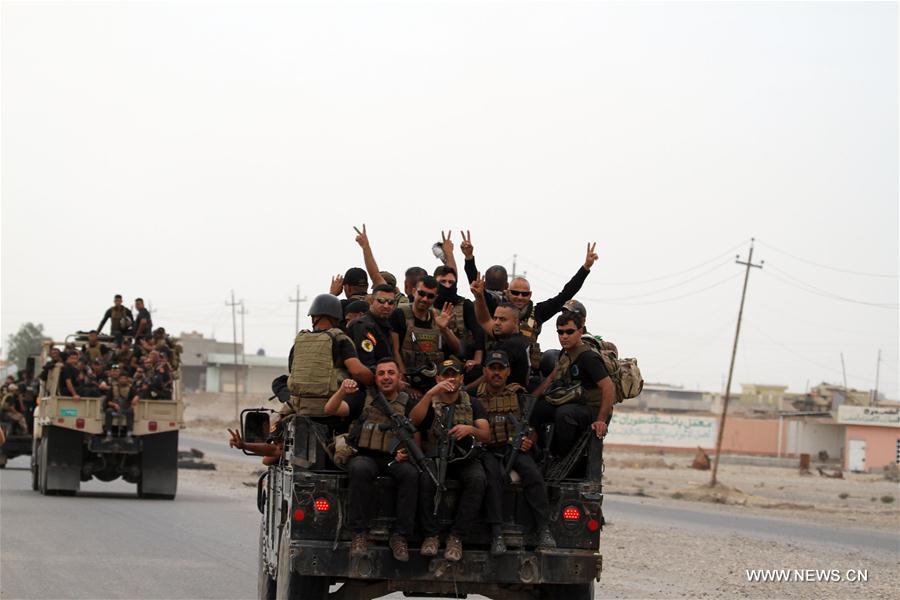The Mosul battle: pessimism for the future
- By George N. Tzogopoulos
 0 Comment(s)
0 Comment(s) Print
Print E-mail China.org.cn, November 2, 2016
E-mail China.org.cn, November 2, 2016
|
|
| Iraqi counter-terrorism forces advance in Gogjali district of Mosul in northern Iraq, on Nov. 1, 2016. The Iraqi counter-terrorism forces, backed by international coalition and Iraqi aircraft, on Tuesday managed to seize Gogjali district on the eastern edge of the city and took control of the state TV building, Lieutenant General Abul-Amir Yarallah said in a statement issued by the Joint Operations Command (JOC). (Xinhua/Yaser Jawad) |
Peace, stability and vision are lemmas almost absent from the lexicon of modern Iraq. The current battle by Iraqi forces – under the American aegis – to liberate Mosul is the culmination of an effort to eliminate the Islamic State in the last two years. It was June 2014 when the terrorist organization captured the Iraqi city. Iraqi Prime Minister Haider al-Abadi has already shown remarkable progress in eradicating extremism – for example in recapturing Falluja in June – but this new mission is more complicated.
To start with, a final potential military victory against the Islamic State in Mosul will not necessarily signal the end of the problem. In his account "Does America Need a Foreign Policy?", Henry Kissinger argued that a "prerequisite for a military campaign against Iraq is to define the political outcome." Indeed, although Washington easily managed to remove Saddam Hussein from power in 2003, it failed to guarantee stability afterwards. As a result, Iraq became a country full of violence and bloodshed, which allowed for the rise of extremist organizations such as the Islamic State.
In spite of ongoing difficulties and the alleged duration of the operation, it can be assumed that the Iraqi forces will – with the American support – recapture Mosul. This will have two important consequences. The first is that the wave of refugees will increase further deteriorating the humanitarian problem. And the second is that some fighters from the Islamic State might be prepared to flee Iraq and go to Syria. In such a scenario, the presence of the terrorist organization will be weakened in the one country and strengthened in the other.
Washington has already anticipated this development. It plans to respond by also launching a campaign to retake Raqqa in Syria, because this city serves as the capital of the Islamic State. This means that the U.S. will continuously be involved in a Middle East conundrum with no clear exit strategy. In September 2014, President Barack Obama warned that a war against the Islamic State could last until after he left office. So, either Donald Trump or Hillary Clinton will be encountered with difficult challenges in the international arena from the beginning of their presidency.
From another perspective, the continuation of regional wars against the Islamic State in Iraq and Syria might serve current military goals but could turn to be counter-productive in the necessary effort to limit radicalization. As long as leaders of the terrorist organization realize that they cannot compete with the international coalitions at the military level, they will intensify their retaliation activities by organizing suicide attacks in the Middle East, Europe and U.S. More importantly, they will endeavor to exploit the current anti-Muslim atmosphere – especially in the Old Continent – by motivating a "bottom-up" type of insurgency against Western elites.
As far as the political future of Iraq is concerned, scholars agree that a high level of decentralization will be required for a sustainable governance model to be introduced and applied. Former National Security Council official in the Obama administration Philip Gordon says that "it will be necessary for every involved party to respect some sort of legitimate political structure." This cannot be taken for granted after the Mosul campaign is over. This is because Iraqi problems existed before the emergence of the Islamic State and have only become exacerbated with its success in the country.
Different groups, which are now collaborating to liberate the Iraqi city, will possibly insist on different political ambitions in the medium-term, preventing consensus. Although Prime Minister Haider al-Abadi will lead the political attempt for gradual decentralization, the Kurds will seek greater autonomy, Shia militias will look for an active role, Sunni fighters will be determined to have a say and minorities will not accept their exclusion.
Last but not least, the future evolution of regional balance should not be ignored. Turkey has for years strived to play the role of a regional superpower in the Middle East with no great success. But now its fundamental national interest is at stake. The more the Kurds are involved in military operations – under U.S. auspices – in Iraq and Syria against the Islamic State, the higher their chances become to achieve their political goals, maybe independence.
To sum up, this analysis does not conclude that the ongoing war against the Islamic State is unnecessary. By contrast, it suggests that military victories – as the one to be possibly achieved in Mosul – are not sufficient. But lessons from modern history are rarely taken into account by relevant stakeholders.
George N. Tzogopoulos is a columnist with China.org.cn. For more information please visit:
http://www.china.org.cn/opinion/GeorgeNTzogopoulos.htm
Opinion articles reflect the views of their authors, not necessarily those of China.org.cn.







Go to Forum >>0 Comment(s)